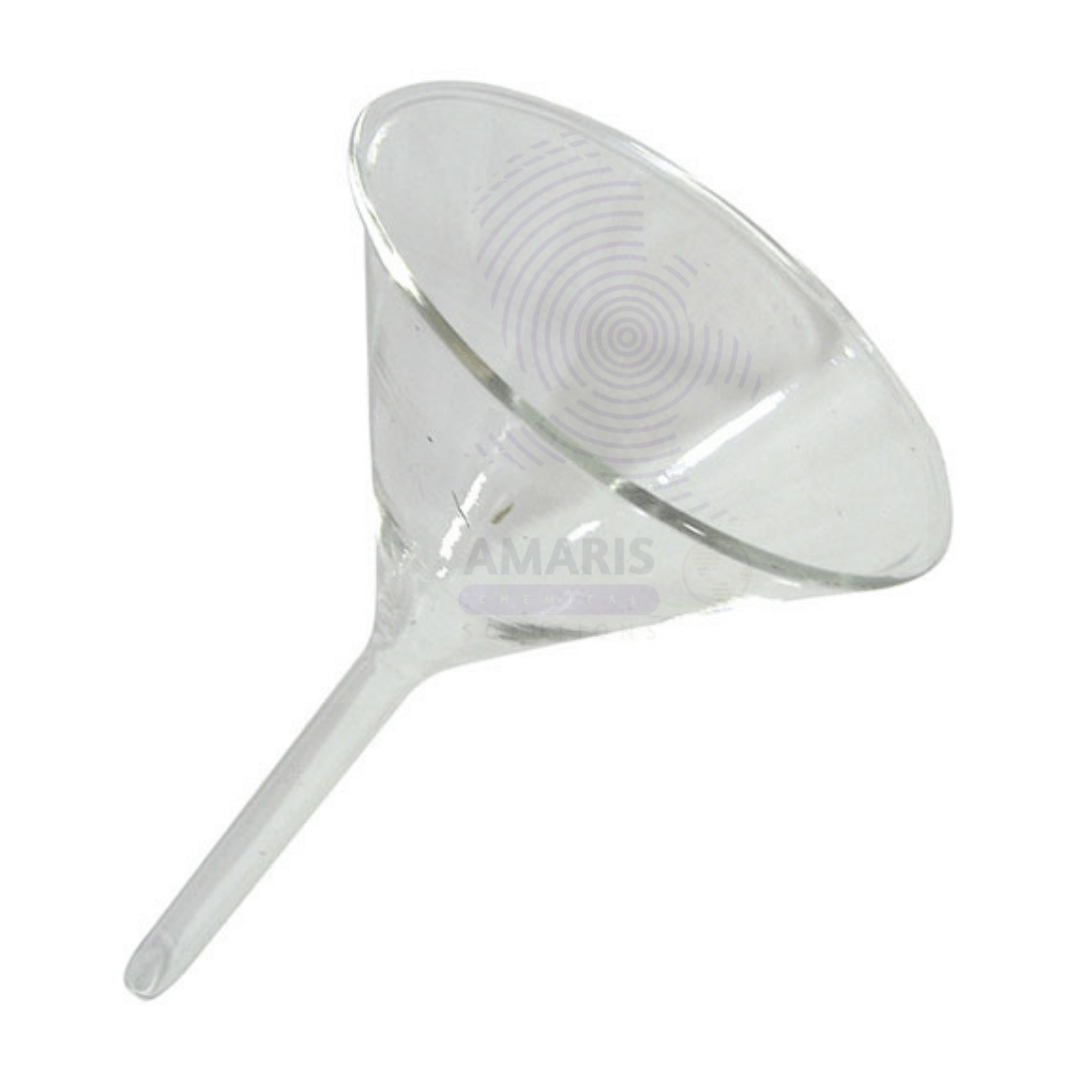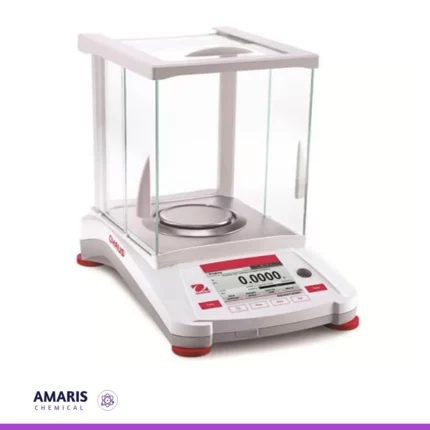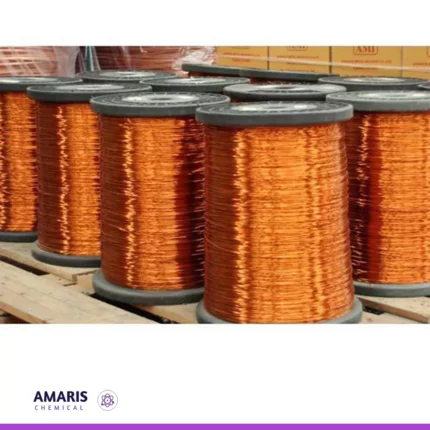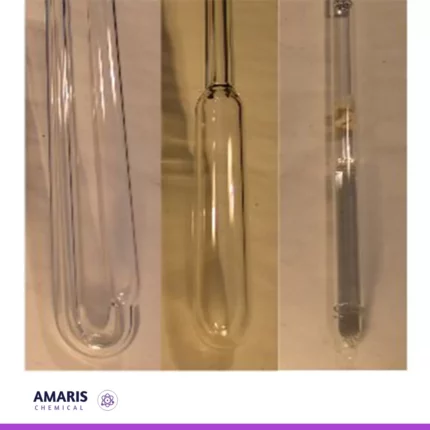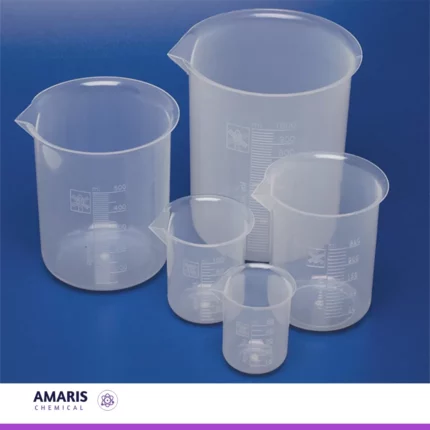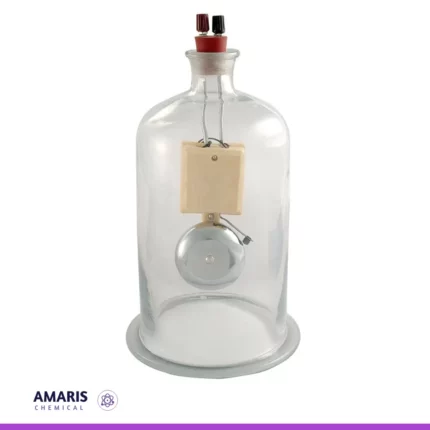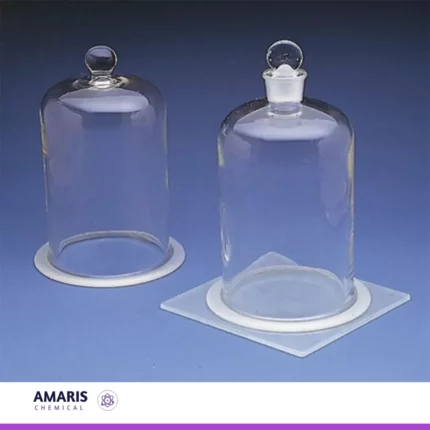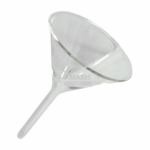
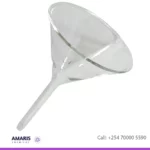
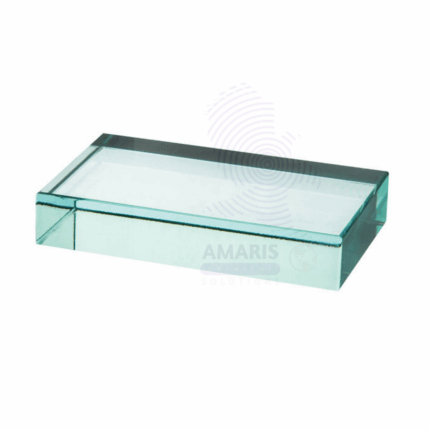
Rectangular Glass Block
$500.00 Original price was: $500.00.$400.00Current price is: $400.00.
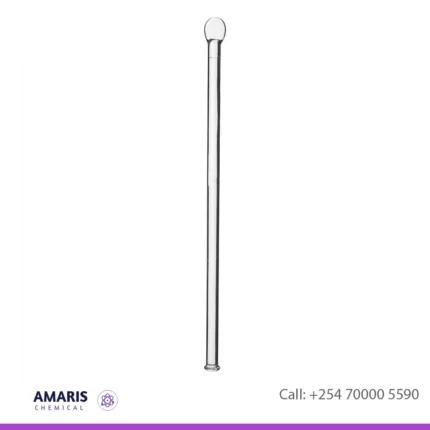
Glass Stirring Rod
$500.00 Original price was: $500.00.$450.00Current price is: $450.00.
Glass Funnel
$250.00 Original price was: $250.00.$200.00Current price is: $200.00.
Whatsapp Order
A glass funnel is a laboratory apparatus used to transfer liquids or fine-grained substances into containers with narrow openings. Here are some key details about a glass funnel:
Description
- Material: Typically made of borosilicate glass, which is resistant to thermal shock and chemical corrosion.
- Shape: Consists of a conical upper section (the wide part) and a cylindrical lower section (the narrow stem).
- Size: Comes in various sizes, typically described by the diameter of the top opening and the length of the stem.
SKU:
ACS87931CHEM0
Category: LABORATORY EQUIPMENT & APPARATUS
Description
Uses of Glass funnel
- Liquid Transfer: Used to pour liquids into containers with small openings to avoid spills.
- Filtration: Often used with filter paper to separate solids from liquids.
- Powder Transfer: Helps in transferring powders without spilling.
Related products
Balance Bathroom Scale
$0.01
bare enamelled copper wire
$0.01
Barometer tubes
$0.01
A barometer tube is a slender, sealed, and typically transparent tube used in barometers to measure atmospheric pressure. It is usually filled with a liquid, often mercury, but sometimes water or another fluid, which rises or falls within the tube in response to changes in atmospheric pressure. The height of the liquid column in the tube serves as an indicator of the current atmospheric pressure, with higher pressure causing the liquid to fall and lower pressure causing it to rise. This measurement helps in predicting weather changes and understanding atmospheric conditions.
Beaker Plastic
$0.01
A plastic beaker is a laboratory container made from plastic material, typically featuring a cylindrical shape with a flat bottom and a spout or pouring lip. It is used for holding, measuring, and mixing liquids or substances during various scientific experiments, research, or educational activities. Plastic beakers come in a range of sizes and are designed to withstand various chemicals and temperatures, making them versatile tools in laboratory settings.
bell in vacuum
$0.01
A "bell in vacuum" apparatus is a scientific setup used to demonstrate the effects of reduced air pressure (vacuum) on sound transmission. It typically consists of a bell or sound-producing object enclosed within a sealed chamber from which air has been removed, creating a low-pressure environment. This apparatus is designed to illustrate how sound travels differently in a vacuum compared to in normal atmospheric conditions, highlighting the role of air molecules in sound propagation.
Bell Jar with knob
$0.01
The best definition of a bell jar apparatus is a scientific instrument used in laboratories to create a controlled environment for various experimental purposes, such as studying the behavior of gases, conducting vacuum experiments, or demonstrating principles of physics and chemistry. It consists of a glass or transparent plastic container shaped like a bell, which can be sealed to create a vacuum chamber. The apparatus allows researchers to manipulate and observe the interactions of substances or objects within the vacuum or controlled atmosphere, often enabling investigations that wouldn't be possible under standard atmospheric conditions.


 Emollients
Emollients Humectants
Humectants UV Filters
UV Filters Surfactants (cosmetic)
Surfactants (cosmetic) Preservatives (cosmetic)
Preservatives (cosmetic) Fragrances and Essential Oils
Fragrances and Essential Oils Antioxidants (cosmetics)
Antioxidants (cosmetics)
 Solvents (lab)
Solvents (lab) Chromatography Chemicals
Chromatography Chemicals Microbiology and Cell Culture Reagents
Microbiology and Cell Culture Reagents Biochemical Reagents
Biochemical Reagents Inorganic and Organic Standards
Inorganic and Organic Standards LABORATORY EQUIPMENT & APPARATUS
LABORATORY EQUIPMENT & APPARATUS Spectroscopy Reagents
Spectroscopy Reagents Molecular Biology Reagents
Molecular Biology Reagents
 Precious Metal Extraction Agents
Precious Metal Extraction Agents
 Plasticizers
Plasticizers Polymerization Initiators
Polymerization Initiators Stabilizers
Stabilizers Monomers
Monomers Fillers and Reinforcements
Fillers and Reinforcements Antioxidants (plastics)
Antioxidants (plastics) Colorants (plastic pigments,Dyes)
Colorants (plastic pigments,Dyes)
 Fertilizers
Fertilizers Plant Growth Regulators
Plant Growth Regulators Soil Conditioners
Soil Conditioners Animal Feed Additives
Animal Feed Additives Biostimulants
Biostimulants
 Dough Conditioners
Dough Conditioners Flour Treatments
Flour Treatments Fat Replacers
Fat Replacers Preservatives (baking)
Preservatives (baking)
 Surfactants (cleaning)
Surfactants (cleaning) Builders
Builders Bleaching Agents
Bleaching Agents Enzymes
Enzymes Solvents (cleaning)
Solvents (cleaning) Fragrances
Fragrances Disinfectant
Disinfectant Metal cleaning
Metal cleaning
 Binders/Resins
Binders/Resins Pigments
Pigments Solvents (paint)
Solvents (paint) Additives
Additives Driers
Driers Anti-Corrosion Agents
Anti-Corrosion Agents Specialty Coatings
Specialty Coatings Functional Coatings
Functional Coatings Application-Specific Coatings
Application-Specific Coatings
 Sealants and Adhesives
Sealants and Adhesives
 Biodegradable Surfactants
Biodegradable Surfactants Bio-based Solvents
Bio-based Solvents Renewable Polymers
Renewable Polymers Carbon Capture Chemicals
Carbon Capture Chemicals Wastewater Treatment Chemicals
Wastewater Treatment Chemicals
 Preservatives (food)
Preservatives (food) Flavor Enhancers
Flavor Enhancers Acidulants
Acidulants Sweeteners
Sweeteners Emulsifiers
Emulsifiers Antioxidants (food)
Antioxidants (food) Colorants (food)
Colorants (food) Nutrient Supplements
Nutrient Supplements Nutraceutical Ingredients
Nutraceutical Ingredients
 Fresh Herbs
Fresh Herbs Whole Spices
Whole Spices Ground Spices
Ground Spices Spice Blends
Spice Blends
 Surfactants(oil)
Surfactants(oil)
 Antibiotics
Antibiotics Active Pharmaceutical Ingredients
Active Pharmaceutical Ingredients Excipients
Excipients Vaccine Adjuvants
Vaccine Adjuvants Nutraceutical Ingredients
Nutraceutical Ingredients Solvents (pharmaceutical)
Solvents (pharmaceutical)
 Automotive chemicals
Automotive chemicals Pyrotechnic Chemicals
Pyrotechnic Chemicals


